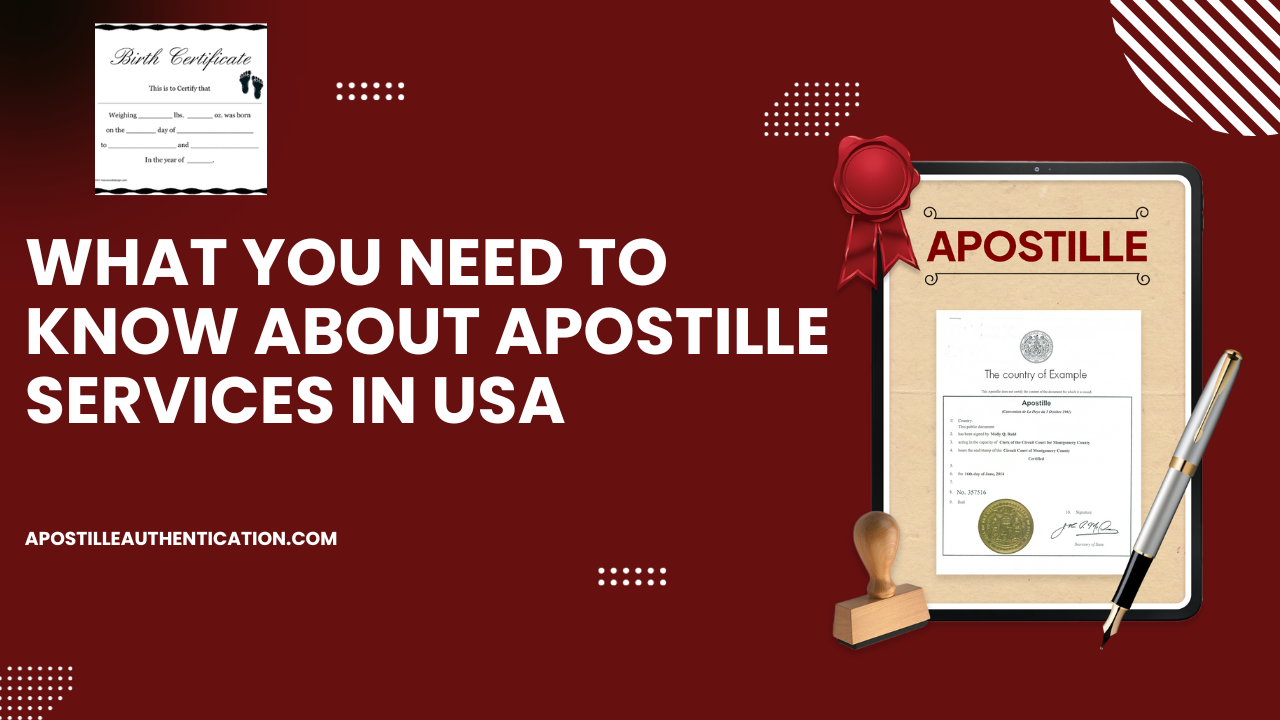Apostille services are a vital component of the legal landscape, ensuring that documents originating in one country are recognized as authentic and legally valid in another. In the United States, the significance of Apostille cannot be overstated, especially in an era where international transactions and collaborations are commonplace.
At its core, an Apostille is a specialized certificate issued to authenticate the legitimacy of a document for use in foreign countries that are part of the Hague Convention. This concise and standardized certification process simplifies the acceptance of documents abroad, streamlining legal procedures and enhancing global communication.
The importance of Apostille in the USA lies in its role as a universal stamp of credibility. Whether it’s a birth certificate, academic transcript, or any other legal document, an Apostille ensures that it is recognized and accepted by foreign governments, institutions, and organizations. This not only facilitates international business and legal transactions but also supports personal endeavors such as travel, education, and residency in foreign countries.
In a globalized world, where individuals and businesses often find themselves navigating international territories, the Apostille process acts as a powerful facilitator, promoting trust and efficiency. Without this authentication, legal documents could face challenges in being acknowledged abroad, potentially leading to delays, misunderstandings, or even legal complications.
Understanding Apostille
An Apostille is a specialized certificate issued to authenticate the legitimacy of a document for use in foreign countries that are part of the Hague Convention. This international treaty, established in 1961, sought to simplify the cumbersome process of legalizing documents for international use. The term “Apostille” itself originates from the French word meaning “certification.”
The Apostille process involves a standardized certificate attached to the original document by competent authorities, affirming its authenticity. This certification is recognized across countries that are signatories to the Hague Convention, streamlining the validation of documents in a universally accepted manner.
How Apostille differs from notarization
While both Apostille and notarization involve authentication of documents, they differ significantly in their scope and recognition. Notarization is a common practice where a notary public services verifies the identity of the document signer and attests to the document’s authenticity. However, this process is primarily recognized within the borders of the issuing country.
In essence, while notarization serves a valuable purpose within domestic legal systems, Apostille broadens the scope, making documents more readily accepted in the global arena. Understanding this distinction is pivotal for anyone navigating international legal transactions or dealing with documents intended for use beyond their home country. As we delve deeper into the Apostille process, we’ll unravel its significance and shed light on how it facilitates seamless interactions across international borders.
When Do You Need Apostille Services?
Navigating the maze of legal requirements can be daunting, especially when it comes to the necessity for Apostille services. Understanding when to seek Apostille authentication is crucial for individuals and businesses involved in international affairs. Let’s explore the scenarios that warrant the use of Apostille services.
- Legal Documents Requiring Apostille
- International Transactions and Agreements
- Academic and Professional Pursuits Abroad
- Residency and Immigration Processes
- Adoption Proceedings
- Court and Legal Proceedings Abroad
Apostille Process Demystified
Unlocking the mysteries behind the Apostille process is key to navigating the complexities of legal document authentication. In this section, we’ll provide a step-by-step guide, demystifying the Apostille process and offering clarity on each stage.
Step 1: Document Verification
The Apostille journey begins with ensuring that the document in question is authentic and has been issued by the appropriate authority. Verify that the document is an original or a certified copy from the issuing agency.
Step 2: Notarization (If Required)
Some documents may need to undergo notarization before Apostille. A notary public verifies the identity of the document signer and attests to the document’s authenticity. Notarization is a prerequisite for certain types of documents, such as powers of attorney.
Step 3: Identify the Competent Authority
Determine the competent authority in your jurisdiction authorized to issue Apostilles. This is often the Secretary of State’s office or a similar government agency. Check the specific requirements and procedures established by the competent authority.
Step 4: Complete Apostille Application Form
Most jurisdictions require the completion of an Apostille application form. Provide accurate information about the document, including its nature, purpose, and any notarization details. Double-check the form for accuracy before submission.
Step 5: Pay Applicable Fees
Apostille services typically involve fees, which can vary based on the document type and processing time. Ensure that you pay the required fees, and consider expedited services if you need the Apostille quickly.
Step 6: Submit Documents
Submit the original document, along with the completed application form and any required supporting documents, to the competent authority. Some jurisdictions may allow for in-person submissions, while others may require mail or online submission.
Step 7: Wait for Processing
The Apostille processing time varies depending on the jurisdiction and the type of service requested. Be patient during this period, and consider any expedited options if time is of the essence.
Step 8: Receive the Apostilled Document
Once the Apostille is issued, you’ll receive the authenticated document with the Apostille certificate attached. This certificate confirms the document’s authenticity and ensures its acceptance in foreign jurisdictions.
Documents That Can Be Apostilled
Understanding which documents are eligible for Apostille is pivotal for individuals and businesses engaging in international affairs. The Apostille process applies to a range of legal documents, each serving a unique purpose. Let’s explore the key documents commonly subjected to Apostille authentication.
Birth Certificates:
Apostille Birth certificates, crucial for various legal and personal matters, can be Apostilled. This authentication ensures their recognition and validity in foreign countries.
Marriage Certificates:
Apostille Marriage certificates, important for legal recognition of marital status, often require Apostille when used in international transactions or immigration processes.
Educational Diplomas and Degrees:
Academic achievements, such as apostille diplomas and degrees, may need Apostille when individuals pursue education or employment opportunities abroad.
Academic Transcripts:
Apostille Transcripts detailing academic records are frequently Apostilled, especially for individuals applying to educational institutions or professional organizations in foreign countries.
Adoption Papers:
Documents related to adoption, including adoption decrees and legal confirmations, may undergo Apostille to facilitate international adoption processes.
Power of Attorney:
Documents granting power of attorney for legal representation or decision-making can be Apostilled, ensuring their acceptance in foreign jurisdictions.
Affidavits:
Sworn statements, or affidavits, often require Apostille when used in legal proceedings or transactions abroad.
Notarized Copies of Documents:
Copies of notarized documents, if required for international use, can undergo Apostille to verify their authenticity.
Court Documents and Judgments:
Legal documents, including court judgments and related paperwork, may need Apostille for enforcement or recognition in foreign legal systems.
Police Clearance Certificates:
Certificates confirming a clean criminal record, essential for various international purposes, can be Apostilled.
Business Documents:
Documents related to business activities, such as certificates of incorporation or partnership agreements, may undergo Apostille for international business transactions.
Wills and Testaments:
Legal documents outlining one’s last wishes, like wills and testaments, can be Apostilled for recognition in foreign probate courts.
Online vs. offline Apostille services
Selecting between online and offline Apostille services is a crucial decision in ensuring a smooth and efficient authentication process. As the proprietor of the website Apostille Authentication, it’s essential to guide your audience on the distinctions between these two options and help them make informed choices based on their specific needs.
Online Apostille Services:
Convenience at Your Fingertips:
Online Apostille services offer the convenience of initiating the authentication process from the comfort of your home or office. Users can submit documents, track the progress, and receive updates through user-friendly online platforms.
Speed and Efficiency:
The digital nature of online services often translates to quicker processing times. This can be advantageous for individuals and businesses with time-sensitive document authentication needs.
Accessible Information:
We can provide comprehensive information about the Apostille process, requirements, and fees. Users can access resources and FAQs, enhancing their understanding before initiating the authentication process.
Secure Document Submission:
Reputable online Apostille services employ secure platforms for document submission, ensuring the confidentiality and integrity of sensitive information throughout the process.
Offline Apostille Services:
In-Person Interaction:
Offline services often involve physically visiting an Apostille service provider, such as a government office or a notary public. This approach allows for face-to-face interaction and direct submission of documents.
Traditional Documentation Process:
Some individuals prefer the traditional approach of submitting hard copies of documents in person. This method may be more comfortable for those who value personal interaction and prefer physical document handling.
Local Presence:
Offline services may be advantageous for individuals who prefer dealing with local Apostille agencies. Local presence can facilitate a more hands-on experience and may be suitable for those with specific preferences or concerns.
Understanding Authentication vs. Apostille
Document validation for international use, two terms often arise: authentication and Apostille. While both serve the purpose of verifying the legitimacy of documents, they differ in scope, recognition, and the processes involved. Let’s unravel the distinctions between authentication and Apostille to shed light on when each is applicable.
Authentication:
Authentication is a broader term that refers to the process of confirming the genuineness of a document, making it legally acceptable in a foreign jurisdiction. This involves obtaining a chain of certifications from various authorities, confirming the legitimacy of the document’s origin.
The authentication process typically starts with notarization by a notary public. Subsequently, the document may need certification by state and federal authorities, and in some cases, the consulate or embassy of the destination country. This multi-step process aims to validate the document’s authenticity on an international scale.
Authenticated documents are recognized beyond the scope of countries that are part of the Hague Convention. This makes authentication a preferred choice when dealing with nations that may not accept Apostilles or for documents intended for use in countries outside the convention.
Apostille:
Apostille, on the other hand, is a specialized form of authentication that streamlines the process for documents used in countries that are part of the Hague Convention. It involves a standardized certificate attached to the document, confirming its authenticity and eliminating the need for additional certifications.
The Apostille process is more straightforward than general authentication. It usually involves a single certification by the competent authority in the country of origin, typically the Secretary of State’s office. The Apostille certificate is then attached to the document, facilitating its acceptance in foreign jurisdictions.
Apostille is specifically recognized by countries that are signatories to the Hague Convention. This streamlined process simplifies cross-border document acceptance, making it an efficient choice for international transactions and legal proceedings among convention member states.
Mobile Apostille Services:
In an era where convenience and efficiency are paramount, the concept of mobile Apostille services has emerged as a game-changer in the world of document authentication. This innovative approach offers individuals and businesses the flexibility of having the Apostille process brought directly to their doorstep. Let’s explore the nuances and benefits of mobile Apostille services.
- Convenience On the Go
- Doorstep Document Handling
- Flexible Scheduling
- Notarization On-Site
- Secure Document Transportation
- Real-Time Updates
- Personalized Assistance
- Time-Saving Solution
Conclusion:
As we conclude our exploration into the intricacies of Apostille services in the United States, it’s evident that understanding the nuances of this process is paramount for individuals and businesses engaged in international affairs. Let’s recap key insights and takeaways covered in this comprehensive guide.
Apostille plays a crucial role in the validation of legal documents for international use, streamlining the acceptance process across countries that are part of the Hague Convention.

